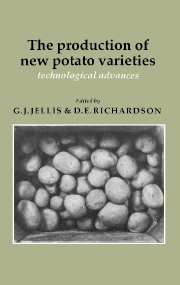Book contents
- Frontmatter
- Contents
- List of contributors
- Preface
- Editors' note and acknowledgements
- Introduction
- The development of potato varieties in Europe
- Genetic Resources
- Breeding Strategies
- Selection and Screening Methods
- Variety Assessment
- Potato variety assessment in the Federal Republic of Germany
- Potato variety assessment in France
- Variety assessment in The Netherlands
- Potato variety assessment in Poland
- Potato variety assessment in the UK
- Use of common origin seed for potato trials
- Micropropagation – an aid in the production of new varieties
- Testing potato varieties for response to drought and irrigation
- Testing varieties for resistance to and tolerance of Globodera pallida
- Testing for glycoalkaloids
- Methods for calculating 1–9 values to express the resistance of potato varieties to diseases
- Establishing standards in variety assessment
- Consumer quality requirements in the United Kingdom
- The effects of fertilizer treatments on a range of old and new early-maturing potato varieties
- Variety trials in Egypt, with special reference to dormancy
- Semi-conventional Breeding Methods
- True Potato Seed
- Unconventional Breeding Methods
- Commentary
- Index
Potato variety assessment in the UK
Published online by Cambridge University Press: 05 March 2012
- Frontmatter
- Contents
- List of contributors
- Preface
- Editors' note and acknowledgements
- Introduction
- The development of potato varieties in Europe
- Genetic Resources
- Breeding Strategies
- Selection and Screening Methods
- Variety Assessment
- Potato variety assessment in the Federal Republic of Germany
- Potato variety assessment in France
- Variety assessment in The Netherlands
- Potato variety assessment in Poland
- Potato variety assessment in the UK
- Use of common origin seed for potato trials
- Micropropagation – an aid in the production of new varieties
- Testing potato varieties for response to drought and irrigation
- Testing varieties for resistance to and tolerance of Globodera pallida
- Testing for glycoalkaloids
- Methods for calculating 1–9 values to express the resistance of potato varieties to diseases
- Establishing standards in variety assessment
- Consumer quality requirements in the United Kingdom
- The effects of fertilizer treatments on a range of old and new early-maturing potato varieties
- Variety trials in Egypt, with special reference to dormancy
- Semi-conventional Breeding Methods
- True Potato Seed
- Unconventional Breeding Methods
- Commentary
- Index
Summary
In order to comply for entry to a National List a variety must be distinct, uniform and stable (DUS), and be of value for cultivation and use (VCU). The DUS requirement is also necessary to establish eligibility for Plant Variety Rights. In the UK there are both statutory and advisory VCU systems. The statutory National List Trials are largely used to eliminate inferior varieties, and the advisory Recommended List Trials aim to select the superior varieties.
NATIONAL LIST
National List testing is conducted on an interdepartmental basis by the agricultural departments for England and Wales, Scotland and Northern Ireland. The Scottish Department coordinates the work, collates the results and prepares the reports. The National Institute of Agricultural Botany acts as agent for the Ministry in England and Wales. A National List DUS/VCU Group makes recommendations on the distinctness and merits of new potato varieties to the UK National List Committee.
Both DUS and VCU tests take place over 2 years. Distinctness tests are based on morphological characters, which closely follow the guidelines of the International Union for the Protection of New Varieties of Plants (UPOV). Uniformity and stability rarely present problems in potatoes.
VCU tests include yield trials and tests for disease resistance and quality. Yield trials consist of two replicates of 100 plants at three centres – Cambridge, Edinburgh and Belfast. Seed is provided by breeders.
- Type
- Chapter
- Information
- The Production of New Potato VarietiesTechnological Advances, pp. 135 - 139Publisher: Cambridge University PressPrint publication year: 1987
- 1
- Cited by



